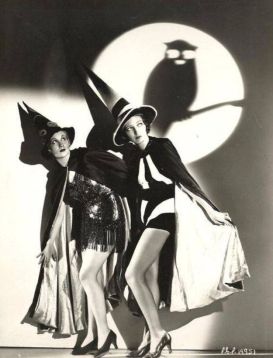 Creepy History 54. For today’s “creepy history”, let’s take a look at the belief in witches during the late 19th Century, with reference to two newspaper articles. The first is from the Hull Packet, from 13th January 1871, and concerns a court case that involved the belief in witchcraft, and a method to protect against it:
Creepy History 54. For today’s “creepy history”, let’s take a look at the belief in witches during the late 19th Century, with reference to two newspaper articles. The first is from the Hull Packet, from 13th January 1871, and concerns a court case that involved the belief in witchcraft, and a method to protect against it:
At the Newtownards Quarter Sessions, in the case of Kennedy v. Kennedy, an extraordinary recital was made. The plaintiff and defendant were brothers – the one a farm servant, the other a farmer – and the action was brought to recover one year’s wages alleged to be due. At the advice of the magistrate, the case was settled by arbitration.
It appeared from the evidence of the plaintiff that on one occasion, during the period he was in the defendant’s service, he was employed in banishing witches out of the house and off the land. Witches were believed to sojourn on the plaintif’s farm, and in consequence some of his cows died, and his crops were of inferior quality. Belief existed in the efficacy of a certain charm, potent in expelling witches; but, although considered unfailing, the experiment was attended with dangerous consequences, and no person could be found bold enough to undertake the carrying out of the necessary directions. The danger lay in the fact that if any one of the requisites of the charm remained unfulfilled, the person endeavouring to effect the banishment would be carried off by the witches, and would never more be heard of.
Plaintiff, who was himself a believer in witchcraft, was induced to undertake the hazardous attempt to work the charm. An evening was agreed upon to put the witches to flight. They were supposed to take up their residence in the house after a certain hour, and remain there till break of day, and, if the charm were successfully worked, they would not only be for ever dislodged from the dwelling, but would never more set foot upon the farm.
The mode adopted was as follows: All the inhabitants left the house, with the exception of the plaintiff, who had to face the witches alone. He locked himself in, closed the windows, stuffed all key-holes and apertures, and put sods on the top of the chimneys. He then pet a large pot of sweet milk on the fire. In the pot he put three rows of pins that had never been used, and three packages of new needles. The milk, needles, and pins were allowed to boil together for half an hour. As there was no outlet for the smoke plaintiff was nearly smothered, and during the time the charm was maturing, he believed he had an encounter with the witches, and succeeded in driving them from the house.
At all events none of them had appeared in the place since; and he had never heard any complaints about the cows milking badly, or the crops not giving satisfaction. The court was convulsed with laughter during this extraordinary recital. On the return of the arbitrators into court, they stated that in the case for the wages they found for the plaintiff in the sum of 10s.
On a similar subject, the following quote is from the Dundee Evening Telegraph, from 26th May 1884:
That the belief in witches is not dead jet may be seen from an anecdote recently related by a Yorkshire shopkeeper: “A woman was lately in my shop, and in pulling out her purse brought out also piece of stick a few inches long. I asked her why she carried that in her pocket. ‘Oh,’ she replied, ‘I must not lose that, or I shall be done for.’ ‘Why so?’ I inquired. ‘Well,’ she answered, ‘I carry that to keep off the witches; while I have that about me they cannot hurt me.’ On my observing that I thought there were no witches nowadays, she observed quickly, ‘Oh yes! There are thirteen this very time in the town, but so long as have my rowan tree safe in my pocket they cannot hurt me.’”
If you found this interesting, please consider sharing on Facebook or Twitter, to help other people find and enjoy Windows into History. You can keep updated each time I post a new entry by clicking on the follow button on the right of the screen. I welcome any comments or suggestions, and will consider guest posts.


The laughter is what catches my particular interest. The belief in witchcraft may have been very real, but definitely not universal. Fascinating post. Thanks!
LikeLiked by 1 person